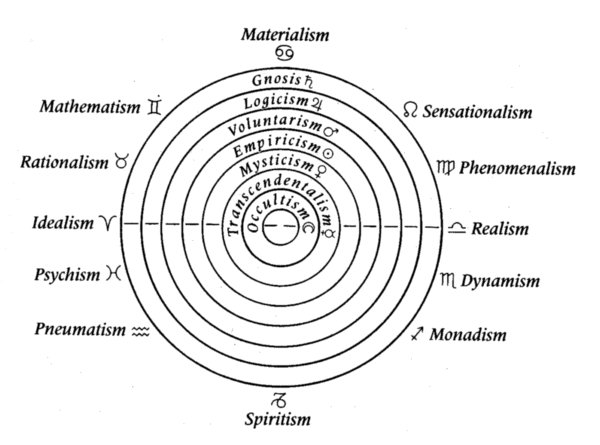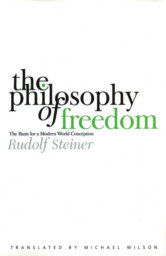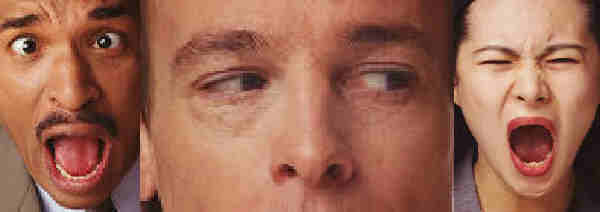
Chapter 1, Conscious Human Action
1-0) MOOD OF OCCULTISM (Moon)
[1] Is man in his thinking and acting a spiritually free being, or is he compelled by the iron necessity of purely natural law? There are few questions upon which so much sagacity has been brought to bear. The idea of the freedom of the human will has found enthusiastic supporters and stubborn opponents in plenty. There are those who, in their moral fervor, label anyone a man of limited intelligence who can deny so patent a fact as freedom. Opposed to them are others who regard it as the acme of unscientific thinking for anyone to believe that the uniformity of natural law is broken in the sphere of human action and thinking. One and the same thing is thus proclaimed, now as the most precious possession of humanity, now as its most fatal illusion. Infinite subtlety has been employed to explain how human freedom can be consistent with the laws working in nature, of which man, after all, is a part. No less is the trouble to which others have gone to explain how such a delusion as this could have arisen. That we are dealing here with one of the most important questions for life, religion, conduct, science, must be felt by anyone who includes any degree of thoroughness at all in his make-up.
1-1) MATERIALISM (Cancer)
It is one of the sad signs of the superficiality of present-day thought that a book which attempts to
develop a new faith out of the results of recent scientific research, has nothing more to say on this
question than these words:
With the question of the freedom of the human will we are not concerned. The alleged freedom of indifferent choice has been recognized as an empty illusion by every philosophy worthy of the name. The moral valuation of human action and character remains untouched by this problem.
It is not because I consider that the book in which it occurs has any special importance that I quote this passage, but because it seems to me to express the view to which the thinking of most of our contemporaries manages to rise in this matter. Everyone who claims to have grown beyond the kindergarten stage of science appears to know nowadays that freedom cannot consist in choosing, at one's pleasure, one or other of two possible courses of action. There is always, so we are told, a perfectly definite reason why, out of several possible actions, we carry out just one and no other.
1-2) SPIRITISM (Capricorn)
[2] This seems obvious. Nevertheless, down to the present day, the main attacks of the opponents of
freedom are directed only against freedom of choice. Even Herbert Spencer, whose doctrines are
gaining ground daily, says,
That everyone is at liberty to desire or not to desire, which is the real proposition involved in the dogma of free will, is negated as much by the analysis of consciousness, as by the contents of the preceding chapter.
1-3) REALISM (Libra)
Others, too, start from the same point of view in combating the concept of free will. The germs of all
the relevant arguments are to be found as early as Spinoza. All that he brought forward in clear and
simple language against the idea of freedom has since been repeated times without number, but as a
rule enveloped in the most hair-splitting theoretical doctrines, so that it is difficult to recognize the
straightforward train of thought which is all that matters. Spinoza writes in a letter of October or
November, 1674,
I call a thing free which exists and acts from the pure necessity of its nature, and I call that unfree, of which the being and action are precisely and fixedly determined by something else. Thus, for example, God, though necessary, is free because he exists only through the necessity of his own nature. Similarly, God cognizes himself and all else freely, because it follows solely from the necessity of his nature that he cognizes all. You see, therefore, that for me freedom consists not in free decision, but in free necessity.
[3] But let us come down to created things which are all determined by external causes to exist and to act in a fixed and definite manner. To perceive this more clearly, let us imagine a perfectly simple case. A stone, for example, receives from an external cause acting upon it a certain quantity of motion, by reason of which it necessarily continues to move, after the impact of the external cause has ceased. The continued motion of the stone is due to compulsion, not to the necessity of its own nature, because it requires to be defined by the thrust of an external cause. What is true here for the stone is true also for every other particular thing, however complicated and many-sided it may be, namely, that everything is necessarily determined by external causes to exist and to act in a fixed and definite manner.
Now, please, suppose that this stone during its motion thinks and knows that it is striving to the best of its ability to continue in motion. This stone, which is conscious only of its striving and is by no means indifferent, will believe that it is absolutely free, and that it continues in motion for no other reason than its own will to continue. But this is just the human freedom that everybody claims to possess and which consists in nothing but this, that men are conscious of their desires, but ignorant of the causes by which they are determined. Thus the child believes that he desires milk of his own free will, the angry boy regards his desire for vengeance as free, and the coward his desire for flight. Again, the drunken man believes that he says of his own free will what, sober again, he would fain have left unsaid, and as this prejudice is innate in all men, it is difficult to free oneself from it. For, although experience teaches us often enough that man least of all can temper his desires, and that, moved by conflicting passions, he sees the better and pursues the worse, yet he considers himself free because there are some things which he desires less strongly, and some desires which he can easily inhibit through the recollection of something else which it is often possible to recall.
[5] Because this view is so clearly and definitely expressed it is easy to detect the fundamental error that it contains. The same necessity by which a stone makes a definite movement as the result of an impact, is said to compel a man to carry out an action when impelled thereto by any reason. It is only because man is conscious of his action that he thinks himself to be its originator. But in doing so he overlooks the fact that he is driven by a cause which he cannot help obeying. The error in this train of thought is soon discovered. Spinoza, and all who think like him, overlook the fact that man not only is conscious of his action, but also may become conscious of the causes which guide him. Nobody will deny that the child is unfree when he desires milk, or the drunken man when he says things which he later regrets. Neither knows anything of the causes, working in the depths of their organisms, which exercise irresistible control over them. But is it justifiable to lump together actions of this kind with those in which a man is conscious not only of his actions but also of the reasons which cause him to act? Are the actions of men really all of one kind? Should the act of a soldier on the field of battle, of the scientific researcher in his laboratory, of the statesman in the most complicated diplomatic negotiations, be placed scientifically on the same level with that of the child when it desires milk: It is no doubt true that it is best to seek the solution of a problem where the conditions are simplest. But inability to discriminate has before now caused endless confusion. There is, after all, a profound difference between knowing why I am acting and not knowing it. At first sight this seems a self-evident truth. And yet the opponents of freedom never ask themselves whether a motive of action which I recognize and see through, is to be regarded as compulsory for me in the same sense as the organic process which causes the child to cry for milk.
1-4) IDEALISM (Aries)
[6] Eduard von Hartmann asserts that the human will depends on two chief factors, the motives and the
character. If one regards men as all alike, or at any rate the differences between them as negligible, then
their will appears as determined from without, that is to say, by the circumstances which come to meet
them. But if one bears in mind that a man adopts an idea, or mental picture, as the motive of his action
only if his character is such that this mental picture arouses a desire in him, then he appears as
determined from within and not from without. Now because, in accordance with his character, he must
first adopt as a motive a mental picture given to him from without, a man believes he is free, that is,
independent of external impulses. The truth, however, according to Eduard von Hartmann, is that,
even though we ourselves first adopt a mental picture as a motive, we do so not arbitrarily, but according to the necessity of our characterological disposition, that is, we are anything but free.
Here again the difference between motives which I allow to influence me only after I have permeated them with my consciousness, and those which I follow without any clear knowledge of them, is absolutely ignored.
1-5) MATHEMATISM (Gemini)
[7] This leads us straight to the standpoint from which the subject will be considered here. Have we
any right to consider the question of the freedom of the will by itself at all? And if not, with what other
question must it necessarily be connected?
[8] If there is a difference between a conscious motive of action and an unconscious urge, then the
conscious motive will result in an action which must be judged differently from one that springs from
blind impulse. Hence our first question will concern this difference, and on the result of this enquiry
will depend what attitude we shall have to take towards the question of freedom proper.
[9] What does it mean to have knowledge of the reasons for one's action? Too little attention has been
paid to this question because, unfortunately, we have torn into two what is really an inseparable whole:
Man. We have distinguished between the knower and the doer and have left out of account precisely
the one who matters most of all — the knowing doer.
1-6) RATIONALISM (Taurus)
[10] It is said that man is free when he is controlled only by his reason and not by his animal passions.
Or again, that to be free means to be able to determine one's life and action by purposes and deliberate
decisions.
[11] Nothing is gained by assertions of this sort. For the question is just whether reason, purposes, and
decisions exercise the same kind of compulsion over a man as his animal passions. If without my co-operation, a rational decision emerges in me with the same necessity with which hunger and thirst
arise, then I must needs obey it, and my freedom is an illusion.
1-7) PSYCHISM (Pisces)
[12] Another form of expression runs: to be free does not mean to be able to want as one wills, but to
be able to do as one wills. This thought has been expressed with great clearness by the poet-philosopher Robert Hamerling.
Man can certainly do as he wills, but he cannot want as he wills, because his wanting is determined by motives. He cannot want as he wills? Let us consider these phrases more closely. Have they any intelligible meaning: Freedom of will would then mean being able to want without ground, without motive. But what does wanting mean if not to have grounds for doing, or trying to do, this rather than that: To want something without ground or motive would be to want something without wanting it. The concept of wanting cannot be divorced from the concept of motive. Without a determining motive the will is an empty faculty; only through the motive does it become active and real. It is, therefore, quite true that the human will is not "free" inasmuch as its direction is always determined by the strongest motive. But on the other hand it must be admitted that it is absurd, in contrast with this "unfreedom", to speak of a conceivable freedom of the will which would consist in being able to want what one does not want.
[13] Here again, only motives in general are mentioned, without taking into account the difference
between unconscious and conscious motives. If a motive affects me, and I am compelled to act on it
because it proves to be the "strongest" of its kind, then the thought of freedom ceases to have any
meaning. How should it matter to me whether I can do a thing or not, if I am forced by the motive to do
it? The primary question is not whether I can do a thing or not when a motive has worked upon me, but
whether there are any motives except such as impel me with absolute necessity. If I am compelled to
want something, then I may well be absolutely indifferent as to whether I can also do it. And if, through
my character, or through circumstances prevailing in my environment, a motive is forced on me which
to my thinking is unreasonable, then I should even have to be glad if I could not do what I want.
[14] The question is not whether I can carry out a decision once made, but how the decision comes
about within me.
1-8) PNEUMATISM (Aquarius)
[15] What distinguishes man from all other organic beings arises from his rational thinking. Activity he
has in common with other organisms. Nothing is gained by seeking analogies in the animal world to
clarify the concept of freedom as applied to the actions of human beings. Modern science loves such
analogies. When scientists have succeeded in finding among animals something similar to human
behavior, they believe they have touched on the most important question of the science of man. To
what misunderstandings this view leads is seen, for example, in the book The Illusion of Freewill, by P.
Rée, where the following remark on freedom appears:
It is easy to explain why the movement of a stone seems to us necessary, while the volition of a donkey does not. The causes which set the stone in motion are external and visible, while the causes which determine the donkey's volition are internal and invisible. Between us and the place of their activity there is the skull of the ass. . . . The determining causes are not visible and therefore thought to be non-existent. The volition, it is explained, is, indeed, the cause of the donkey's turning round, but is itself unconditioned; it is an absolute beginning.
Here again human actions in which there is a consciousness of the motives are simply ignored, for Rée declares that "between us and the place of their activity there is the skull of the ass." To judge from these words, it has not dawned on Rée that there are actions, not indeed of the ass, but of human beings, in which between us and the action lies the motive that has become conscious. Rée demonstrates his blindness once again, a few pages further on, when he says,
We do not perceive the causes by which our will is determined, hence we think it is not causally determined at all.
[16] But enough of examples which prove that many argue against freedom without knowing in the least what freedom is.
1-9) MONADISM (Sagittarius)
[17] That an action, of which the agent does not know why he performs it, cannot be free, goes without
saying. But what about an action for which the reasons are known? This leads us to the question of the
origin and meaning of thinking. For without the recognition of the thinking activity of the soul, it is
impossible to form a concept of knowledge about anything, and therefore of knowledge about an
action. When we know what thinking in general means, it will be easy to get clear about the role that
thinking plays in human action. As Hegel rightly says,
It is thinking that turns the soul, which the animals also possess, into spirit.
1-10) DYNAMISM (Scorpio)
[18] On no account should it be said that all our action springs only from the sober deliberations of our
reason. I am very far from calling human in the highest sense only those actions that proceed from
abstract judgment. But as soon as our conduct rises above the sphere of the satisfaction of purely
animal desires, our motives are always permeated by thoughts. Love, pity, and patriotism are driving
forces for actions which cannot be analyzed away into cold concepts of the intellect. It is said that here
the heart, the mood of the soul, hold sway. No doubt. But the heart and the mood of the soul do not
create the motives. They presuppose them and let them enter.
1-11) PHENOMENALISM (Virgo)
Pity enters my heart when the mental picture of a person who arouses pity appears in my
consciousness. The way to the heart is through the head, Love is no exception. Whenever it is not
merely the expression of bare sexual instinct, it depends on the mental picture we form of the loved
one. And the more idealistic these mental pictures are, just so much the more blessed is our love. Here
too, thought is the father of feeling.
1-12) SENSATIONALISM (Leo)
It is said that love makes us blind to the failings of the loved one. But this can be expressed the other
way round, namely, that it is just for the good qualities that love opens the eyes. Many pass by these
good qualities without noticing them. One, however, perceives them, and just because he does, love
awakens in his soul. What else has he done but made a mental picture of what hundreds have failed to
see? Love is not theirs, because they lack the mental picture.
[19] However we approach the matter, it becomes more and more clear that the question of the nature
of human action presupposes that of the origin of thinking. I shall, therefore, turn next to this question.
~^~
~~~~~~~~~~~~~~~~~~~~~~~~~~~~~~~~~~~~~~~~~~~~~~~~~~~~~~~~~~
To Obtain your own Copy of this Reviewed Book, Click on SteinerBooks Logo below and order a copy of this book.

~~~~~~~~~~~~~~~~~~~~~~~~~~~~~~~~~~~~~~~~~~~~~~~~~~~~~~~~~~
~~~~~~~~~~~~~~~~~~~~~~~~~~~~~~~~~~~~~~~~~~~~~~~~~~~~~~~~~~
 ~~~~~~~~~~~~~~~~~~~~~~~~~~~~~~~~~~~~~~~~~~~~~~~~~~~~~~
~~~~~~~~~~~~~~~~~~~~~~~~~~~~~~~~~~~~~~~~~~~~~~~~~~~~~~




